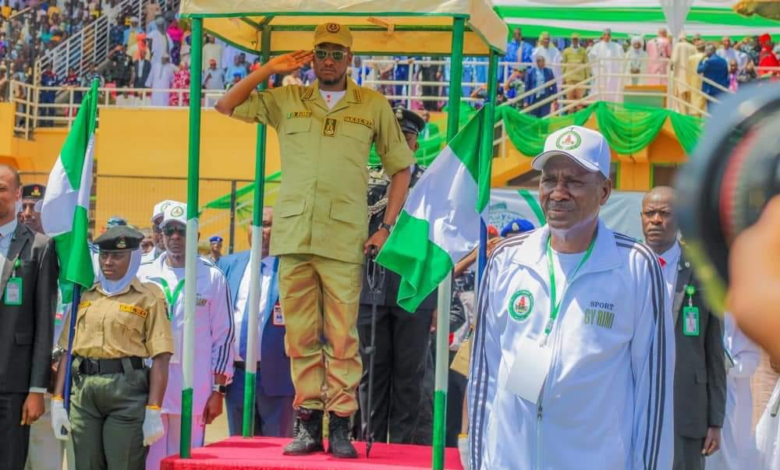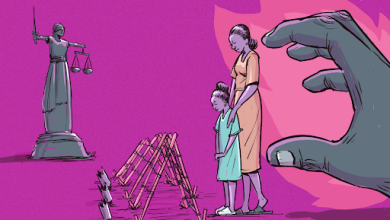Can The New Community Guards Slow Tide Of Armed Violence In Nigeria’s North West?
The establishment of community guards holds a lot of prospects for regional stability in Nigeria. Experts say it can make or mar the troubled region.

A week after killing 14 locals and wounding 17 others during a religious procession at Rugar Kusa village in Katsina, terrorists stormed Sayaya village in Matazu, another local district of the state, killing five persons and abducting seven.
These are not isolated cases.
Terrorists are on the prowl in Nigeria’s northwestern region. Since 2011, when the conflict escalated, an estimated 12,000 people have died and hundreds of thousands displaced across states in the region, especially in rural communities where security response is slow or totally absent. In Katsina, for instance, there were fewer than 3000 police personnel serving the state’s residents, according to former governor Aminu Bello Masari.
Let’s put that into perspective. With a projected population of 10.4 million in 2022, it means for every 100,000 residents, there are only 29 police officers available in the state. This makes it challenging for them to adequately respond to distress calls or repel the terrorists.
It is not any different in other parts of the North West, a region grappling with mass killings and a booming kidnap-for-ransom enterprise for more than a decade now. There are about a hundred armed groups with over 30,000 terrorists operating in the region.
To curb the raging conflict, authorities in the troubled region are beginning to float community guards, a model of the Civilian Joint Task Force that emerged in the North East, to support conventional security agencies. In July this year, Zamfara, the heart of the conflict, unveiled Community Protection Guards. Sokoto, another hard-hit state, has also constituted a panel to deliberate on establishing its own community guards.
Just a few weeks ago, about 1,466 Community Watch Corps members were deployed to the eight frontline communities in Katsina. The governor, Dikko Radda, believes the very essence of the corps “lies in community engagement, collaboration, and mutual respect.” By leveraging localised knowledge, he proposed, the state is not “merely addressing symptoms but targeting the roots of insecurity”.
The young men and women were trained in weapons handling and other security-related activities for two months.
Members of the corps were recruited from the communities directly affected by the conflict. Authorities believed that by being victims, they would channel their resentment into fighting the terrorists.
“We didn’t consider certificates or qualifications; what we were concerned about was their ability to protect their parents and loved ones. The reason we choose these people is because they were directly affected: their parents were killed, their sisters were raped, so they have more courage to do this job,” said the governor.
Unfortunately, the deployment of the corps to the areas has culminated in a renewed wave of attacks, a development, experts say, is a ploy by the terrorists to deter local communities from joining or lending a hand to security agents in the ongoing offensive against them.
“The recent attacks are a result of the bandits trying to discourage local communities from joining the community guards initiative or from cooperating with the military in their ongoing operations,” said James Barnett, a specialist in Nigerian politics and security at the U.S. think tank, Hudson Institute.
In many parts of the North West, civilians are increasingly filling security gaps in rural communities where terrorists hold sway. They perform strategic operations like repelling attacks, arresting criminals, and identifying terrorists’ hideouts. Sometimes, they take part in joint security operations with state agencies.
The groups range from a small band of volunteers to large groups raised or at least given quiet approval by state governments.
A long history of band-aid
The fluid nature of conflict in the North West makes it highly unpredictable and difficult to contain. The terrorists, numbering tens of thousands, have developed a degree of sociopolitical influence and sophistication that defies the many responses that have been adopted so far.
Authorities in the region, including state governors, federal agencies, and the military, have had a disjointed approach to the armed violence over the years. They have stood behind contrasting approaches, with some favouring dialogue and others opting instead for kinetic action or even mobilising militias along ethnic lines.
“There is little cohesion among either the militants or the government, which makes it very difficult to establish consensus within one camp let alone broker some sort of cessation of hostilities between the insurgents and the different appendages of the state,” Barnett told HumAngle.
“The bandits themselves are divided into dozens of gangs that are often rivals and are frequently fracturing or shifting their alliances. So, while some kingpins might engage in dialogue with the government, others will opt out of the dialogue and even escalate their terrorism to signal their opposition or frustration.”
This is what is currently happening in Katsina’s ravaged communities with the deployment of the guards.
There are other big concerns.
Members of the Community Watch nurse deep resentment for the terrorists. Some of them were uprooted from their homes as a result of the conflict. It’s equally important to note that most of those engaged were already members of local vigilantes. This may likely flaw their operations, given the ethnic identity the crisis has assumed. Local vigilantes have been accused of extrajudicial killings of Fulani, the ethnic group majority of the terrorists are believed to come from — even though other ethnicities and criminal groups have since joined the fold and Fulani communities are themselves not spared in their ruthless campaign.
HumAngle has reported how ethnic profiling and the extrajudicial killings of Fulani people have continued to fuel the ember of the conflict plaguing the region.
“The approach does not have a great track record to date,” Barnett said, “as these groups tend to have limited training and target a lot of ordinary Fulani citizens on the presumption that they are linked to bandits, a form of profiling that feeds the grievances that underpin the banditry crisis.”
Differences along political lines have also interfered with sustained policy plans to nip the crisis in the bud. In October, Col. Garba Moyi (Rtd) resigned barely hours after he was appointed chairman of the 25-member committee for the establishment of Sokoto Community Guards. The three-time commissioner for security in the state quit the position over a viral footage he said was released on social media linking him with terrorism in the eastern flank of the state. “Shortly after my appointment, some disgruntled elements in the state went on a campaign of calumny with a view to tarnish my reputation,” he told newsmen.
It’s not any different in Zamfara, where the present governor, Dauda Lawal, and his predecessor, Bello Mattawalle, who is now Defence Minister, are trading words over the worsening security situation in the state. “Partisan politics can also meddle in the formulation of coherent policy, as seen in the ongoing disputes between, for example, the present Zamfara governor and his predecessor,” Barnett stressed.
A stitch in time, but where to go from here?
What do residents think about the Community Guards approach? Many believe it’s a necessary step but also that it is a long shot to ending the orgy of violence.
“Authorities in the region have taken a step towards finding solutions to the crisis. Unfortunately, there is a huge task ahead of the guards,” said Buhari Moriki, a community development worker based in Zamfara.
“The number of community guards and security personnel do not even measure to that of the gangs, who are already stepping up their recruitment, and the sophisticated weapons they wield, thus making it challenging for the new guards to quickly register their mark.”
Meanwhile, experts say the authorities would need to avoid the drawback of dealing with the conflict through ethnicised lens.
“If the latest initiatives are to be effective, they (governors of northwestern states) will need to avoid the pitfalls of previous mobilisations such as those of the Yan Sakai, whose approach of de facto ethnic conflict has proven to be counterproductive as it has fed the conflict cycle of tit-for-tat violence in the North West rather than reducing insecurity,” Barnett advised.
This is also the position of Jesse Attah, Lead Risk Intelligence and Analysis at Beacon Consulting. The researcher believes the supervisory agency — the State Ministry of Internal Security — must prioritise a thorough understanding of its responsibilities. Its role, he noted, “is to optimise operational capabilities, not to antagonise”. It should provide continuous kinetic training to match the criminal groups’ capabilities while at the same time encouraging non-kinetic conflict resolution to reduce the potential for violence and abuse.
“A robust legal framework is also crucial to protect guards from political interference,” Attah suggested. “Community engagement is essential for security awareness and fostering citizen support while ensuring inclusivity across diverse ethnic groups to maintain communal relations.”
Support Our Journalism
There are millions of ordinary people affected by conflict in Africa whose stories are missing in the mainstream media. HumAngle is determined to tell those challenging and under-reported stories, hoping that the people impacted by these conflicts will find the safety and security they deserve.
To ensure that we continue to provide public service coverage, we have a small favour to ask you. We want you to be part of our journalistic endeavour by contributing a token to us.
Your donation will further promote a robust, free, and independent media.
Donate HereStay Closer To The Stories That Matter




